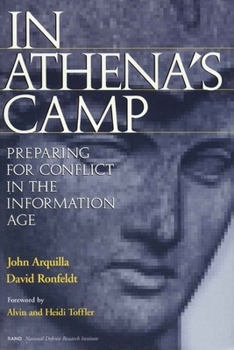In Athena's Camp: Preparing for Conflict in the Information Age
Select Format
Select Condition 
Book Overview
Essays about conflict in the information age that show how the information revolution is altering the nature of conflict.
Format:Paperback
Language:English
ISBN:0833025147
ISBN13:9780833025142
Release Date:October 1997
Publisher:RAND Corporation
Length:460 Pages
Weight:1.55 lbs.
Dimensions:1.3" x 5.4" x 9.6"
Customer Reviews
2 ratings
A theoretical look at the next face of conflict
Published by Thriftbooks.com User , 24 years ago
This book tackles international computer system threats that face nations and corporations head on. It presents a theoretical framework for action and will be a valuable resource for the next decade.Athena was also a serious topic in ancient times when she was the Greek god with a sword and shield, the one who thought up the first Trojan horse... a legacy that connects well with today's netwars.The authors of each chapter address different issues. Most are from the perspective of military issues. Many use clear historic perspectives to show how one side or the other lost conflicts, for example, the use of smart networks by Mongols to defeat Muslims and by Ho Chi Minh against Lyndon Johnson. Other examples are drawn from the gulf war; the chief of which is that the next opponent will likely not be as dumb as Saddam.Oddly there isn't much in the book about China and Russia, the cyber-bullies of today's world. Even if one did want to look up material on these countries the missing index prevents it. With a new abbreviation on every page it would also be helpful to have a Rosetta stone inside the back cover.The example of the wild west is used and very applicable here. There are only isolated pockets of law and order. Good and bad guys are hard to distinguish. Outside occasional enclaves good guys can only trust their resources and a few friends. This high level discussion can be directly translated to domains, firewalls, and virtual private networks. It argues against lowest-bidder security implementations.Computer network managers will understand diminishing role of government in the direction of commercial systems. This means less traditional compliance-driven security technology will be available. Corporate security, network administrators and infrastructure managers are out there on their own. "Street smart" information behavior will be necessary to survive.Through the book the term "cyber" is overused. It almost never appears in serious government discussions or commercial security where the emphasis is on all aspects of network issues. Security managers who want a superficial self improvement should skip this book. It is very concept-dense and filled with ideas which will cause the reader to stop and think about strategy. Few solution specifics are presented. Concepts in this book are suited for someone who is developing a strategic vision for protecting their organization from network attacks. [adapted from a review published in Security Management. All rights reserved by the author]
A very important book on security policy
Published by Thriftbooks.com User , 26 years ago
In Athena's Camp is, in my eyes, one of the most important books in the area of security policy at the given momnent, alongside 'Sources of Conflict', which has been published by Rand, too. I used the book in a term paper I wrote for political sciences, in which I examined the coming threats in context with the momentary policy of the german government (as I am German and studying here). The book was of utmost importance to me in this case, as it is, as far as I know, the only book covering this topic on such a high level of quality at the moment. Further research also revealed to me, that the momentary german policy is utmost abysmal, and that, surprisingly, the German Green Party, Bündnis 90/ Die Grünen, would maintain the best policy in case of election (just for your information). To all students of political sciences worldwide who love researching the field of global and societal change through the information revolution, get it.






